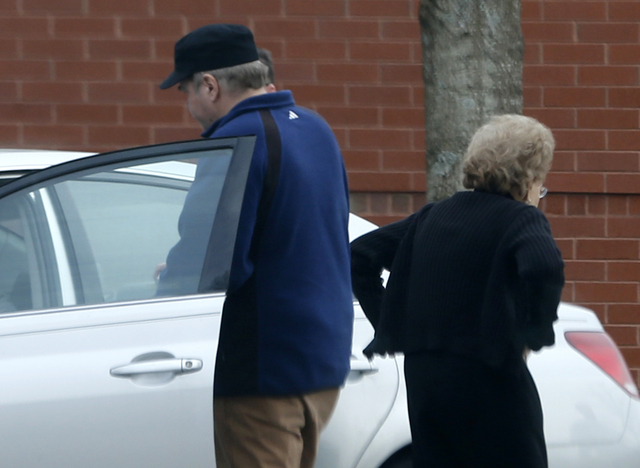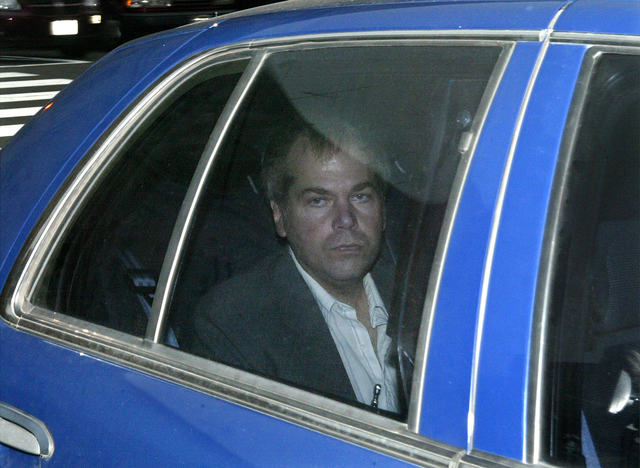WASHINGTON (AP) — More than 35 years after he tried to assassinate President Ronald Reagan in an effort to impress actress Jodie Foster, John Hinckley Jr. will be allowed to leave a Washington mental hospital and live full time with his mother in Virginia, a federal judge ruled Wednesday.
Judge Paul Friedman wrote in a 14-page ruling and accompanying 103-page opinion that Hinckley — who currently spends more than half his days at his mother’s home — is ready to live full time in the community. Friedman granted Hinckley leave from the hospital starting no sooner than Aug. 5.
Doctors have said for many years that Hinckley, 61, who was found not guilty by reason of insanity in the shooting, is no longer plagued by the mental illness that drove him to shoot Reagan.
Three others were wounded in the March 30, 1981, shooting outside a Washington hotel, including Reagan’s press secretary, James Brady, who suffered debilitating injuries and died in 2014. His death was later ruled a homicide, but prosecutors said they would not charge Hinckley with murder, in part because they would be barred from arguing he was sane at the time of the shooting.
The shooting endangered Reagan’s life, but he recovered after undergoing emergency surgery. He died in 2004 at age 93.
Hinckley was a “profoundly troubled 25-year-old young man” when he shot Reagan, but his mental illnesses — major depression and psychotic disorder — have been in remission for more than 27 years, Friedman wrote.
“Mr. Hinckley, by all accounts, has shown no signs of psychotic symptoms, delusional thinking, or any violent tendencies,” the judge wrote in his opinion. “The court finds that Mr. Hinckley has received the maximum benefits possible in the inpatient setting (and) that inpatient treatment is no longer clinically warranted or beneficial.”
Hinckley’s release from Washington’s St. Elizabeths hospital has been more than a decade in the making. In late 2003, the judge allowed Hinckley to begin leaving the hospital for day visits with his parents in the Washington area.
In 2006, Hinckley began visiting his parents’ home in Williamsburg, Virginia, for three-night stretches. That time has increased over the years so that for the past two-plus years he has been allowed to spend 17 days a month at the house overlooking a golf course in a gated community.
Largely remembered for his boyish mugshot, Hinckley is now a doughy man with graying hair who wears hats or visors when he drives around Williamsburg in a Toyota Avalon, going to movies and fast-food restaurants. He also plays guitar, paints and cares for feral cats.
While outside the hospital, Hinckley has had to comply with a series of restrictions, and some of those will continue now that he will be living full time in the community. He must attend individual and group therapy sessions and is barred from talking to the media. He can drive, but there are restrictions on how far he can travel. The Secret Service also periodically follows him.
Despite the restrictions, life in Williamsburg will likely be busy for Hinckley. The judge ordered him to volunteer or work at a paid job at least three days a week. He has sought out work and volunteer opportunities, but so far has been unable to secure employment. According to court records, he has said it was difficult for him to ask for jobs at Starbucks and Subway while being followed by the Secret Service: “It made me feel awkward and uncomfortable.”
According to court records and testimony at a hearing on the issue of his release, he has spent time volunteering at a church as well as a local mental hospital. He has attended meetings for people living with mental illness, talks at a local art museum and concerts. In addition to painting and guitar, he has recently developed an interest in photography.
“I don’t like flipping around the TV, I want to do things,” a court document quoted him saying.
He also has said he wants to “fit in” and be “a good citizen.”
Hinckley must return to Washington once a month for doctors to check on his mental state and his compliance with the conditions of his leave, the judge ruled.
He also will be barred from trying to contact Foster, all relatives of Reagan and Brady or the other two victims, police officer Thomas Delahanty and Secret Service agent Timothy McCarthy, and their families.
He will have to live with his mother for a year. After that, he will have the freedom to live on his own, with roommates or in a group home in the Williamsburg area. If his 90-year-old mother, Joann, is unable to monitor him, his brother or sister have agreed to stay with him until other arrangements are made. Hinckley’s father died in 2008.
Paul Appelbaum, a professor of psychiatry at Columbia University and a past president of the American Psychiatric Association, said a strong family support system is critical for people like Hinckley as they reintegrate back into society.
“In some sense, the change from being out 17 days a month and being out 30 days a month is not all that great,” Appelbaum said. “What would be a tremendous change would be living with your mother as opposed to living on your own for the first time in more than 35 years.”
Some of the conditions of his leave could be eliminated or reduced within 12 to 18 months, but if he violates the remaining conditions, he still could be taken back to the hospital.
Hinckley’s attorney, Barry William Levine, did not immediately return a message seeking comment Wednesday. William Miller, a spokesman for the U.S. attorney’s office in Washington, said the office is reviewing the ruling and has no comment.
Prosecutors had consistently opposed Hinckley’s efforts to gain more freedom, citing what they called a history of deceptive behavior. In July 2011, prosecutors said, Hinckley was supposed to go see a movie and instead went to a Barnes & Noble, where Secret Service agents saw him looking at shelves that contained books about Reagan and the assassination attempt. He didn’t pick up any of the books.
———
Associated Press writers Sarah Brumfield and Jessica Gresko in Washington and Alanna Durkin Richer in Richmond, Virginia, contributed to his report.








